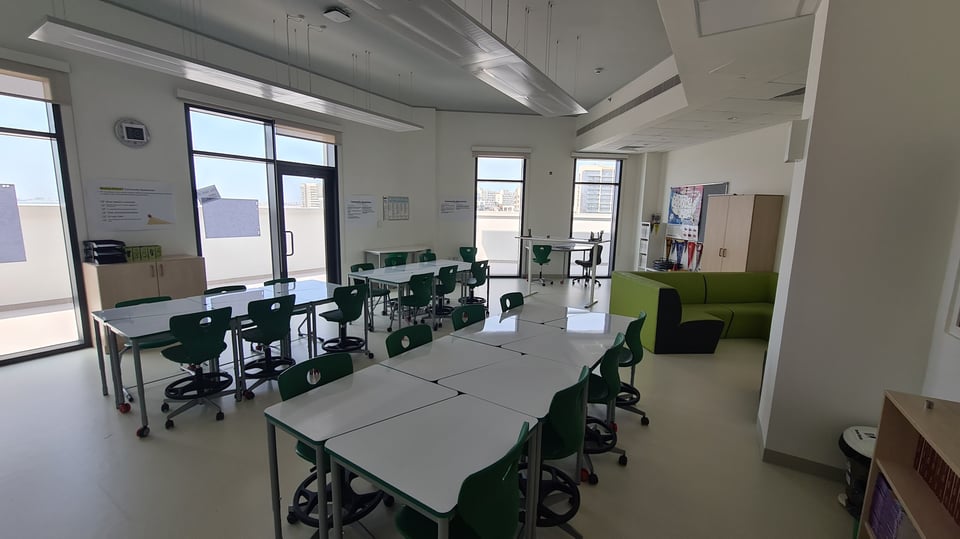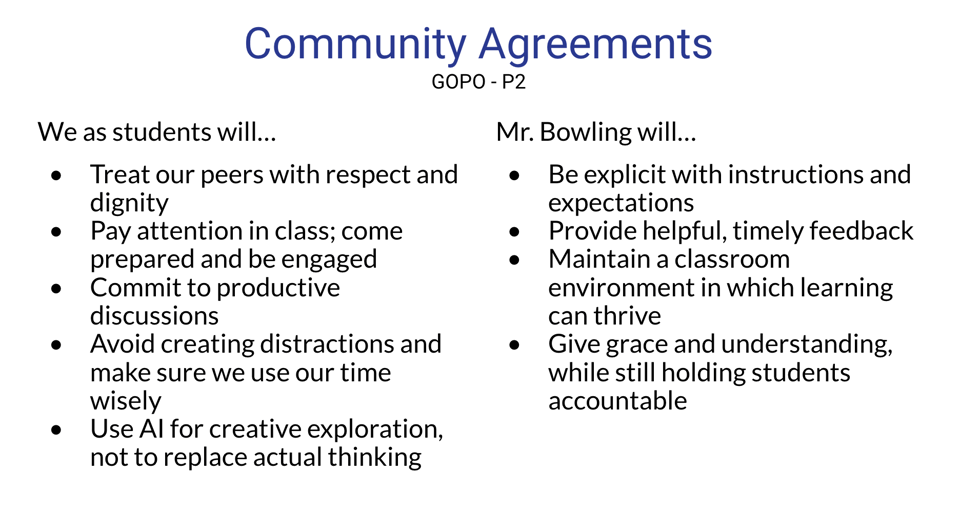Starting Well

School in the Gulf gets underway earlier than it does back home. Schools on the West Coast (and New York) seem to have the latest start times in the US, so this week’s newsletter is largely for my homies in the game back home.
In year six abroad and nineteen overall, things have gotten off to a positive start. We have a new administration at the high school in Abu Dhabi, and I’d be lying if I said I wasn’t feeling some apprehension beforehand. I’m not particularly fond of change, and this is only the second time in my career that I’ve experienced the principal who hired me departing—the last time was back in 2008. That said, things are going well and the new “Skipper” seems to be knocking it out of the park.
By the second day of class, my grade eleven students were off to the races reading about and discussing the origins of Western democracy and the writings of John Locke and Thomas Hobbes. This year I threw an extra text into the mix from Anarchy, State, and Utopia by Robert Nozick. While Nozick isn’t my cup of tea, there’s plenty to ponder and pick at in his writing.
Meanwhile, the grade twelve students researched indicators to compare countries and wrote about how the media/business world’s focus on GDP distorts our understanding of what’s really happening in a state. That led to a lively conversation about the Human Development Index (HDI), a UN-created measure, that assesses health, wealth, and education in states, and the Freedom House Index, which evaluates the level of political freedoms within a country.
The students initially presumed that democratic states would naturally have higher HDI levels. While this is usually true, there are several states that deviate from this pattern (shout out to Singapore). This swerve sparked more exploration as we went down a rabbit hole for a bit, searching for places where the gap between political freedom and collective well-being is most pronounced. It was a joy to see them dive into the data with such enthusiasm so early in the school year.
New school years are weird. New school years internationally are weirder because of how much turnover there is in the student body and faculty (here’s is a video introducing the new staff this year). We said goodbye last year to a couple who Hope and I really enjoyed as they relocated to Zambia. There’s also a churn in students, in addition to the kids that graduate and head off to college, work situations change, especially given how many of the families work in contracting (energy & defense) and as diplomats. All that change year-to-year highlights the importance of classroom culture and routines.
Oddly, one of the more impactful books on my teaching is The First Days of School by (the late) Harry Wong. Wong’s book emphasized the importance of establishing clear procedures and routines from the very beginning of the school year, which helps create a stable and effective classroom environment where learning can thrive.
This is something I brought with me from the US. Last week, I wrote about the impact of a lack of predictability and stability on the ability of students to excel in a classroom. I don’t reckon it’s any different here and I don’t treat my students any differently that I did in Tacoma.
One of the tools I use is the generation of community agreements for each class. They’re the social contract we govern ourselves by. We spend about half a period crafting them; it is the classic slow down to hurry up situation. I end up burning a chunk of class time but it leads to a better environment and crystal clear understanding by all parties about the desired culture.

You’ll note that this year as part of establishing our community agreements, I intentionally had students create some language about the appropriate use of various AI tools.
Here is what three different classes came up with. Each is preceded by a “We will…”:
use AI to help us learn but make sure we’re submitting our own thinking and work
use AI as a tool for learning but not as a substitute for our own thinking and reasoning
use AI to help us in the process but will be the authors of our final work
I explained to students that I use AI from time-to-time but “I’ll be damned if I’m gonna spend my evenings and planning periods reading ‘your’ clearly AI generated work” and it seemed like they really felt that.
When I was a Reservist, the Air Force was obsessed with “Continuous Improvement” under the TQM or Total Quality Management Model. The model revolves around the idea that processes and systems should be constantly evaluated and refined to enhance efficiency, quality, and performance, with an emphasis on incremental changes rather than drastic overhauls. I don’t know what they’re calling it now but the idea of “continuous improvement” has stuck with me beyond my time in the military and throughout my teaching career.
This is all a meandering way of saying we can only get better if we ask for better. I spent a fair amount of time last spring, after the seniors left, thinking about what worked and what didn’t. Obviously, in a classroom it’s worth taking the time to set clear expectations. But it also matters to explain the why behind them. It gives students a voice in setting the culture of the space, promotes lateral or peer-to-peer accountability, and increases overall buy-in.
–
As we close, I suggest you check out a travelog from our trip to Cyprus that my wife, Hope, wrote-up. Cyprus is wonderful. Its history is plentiful and if you’re in the region you should hit it up.
Also, suggest you check out the most recent episode of the podcast. The episode features Quincy Henry, the owner and operator of Campfire Coffee, a Black owned and operated coffee shop located in Downtown Tacoma. Campfire offers a non-bougie experience and Quincy and his wife use a portion of the proceeds from the shop to support outdoor activities for kids-of-color and low-income families in the community.
He's dope and we'll have one more of these Tacoma small business episodes next week, featuring Balcon X, which is sneakily home of some of the best food on 6th Avenue.
See you next week!